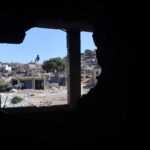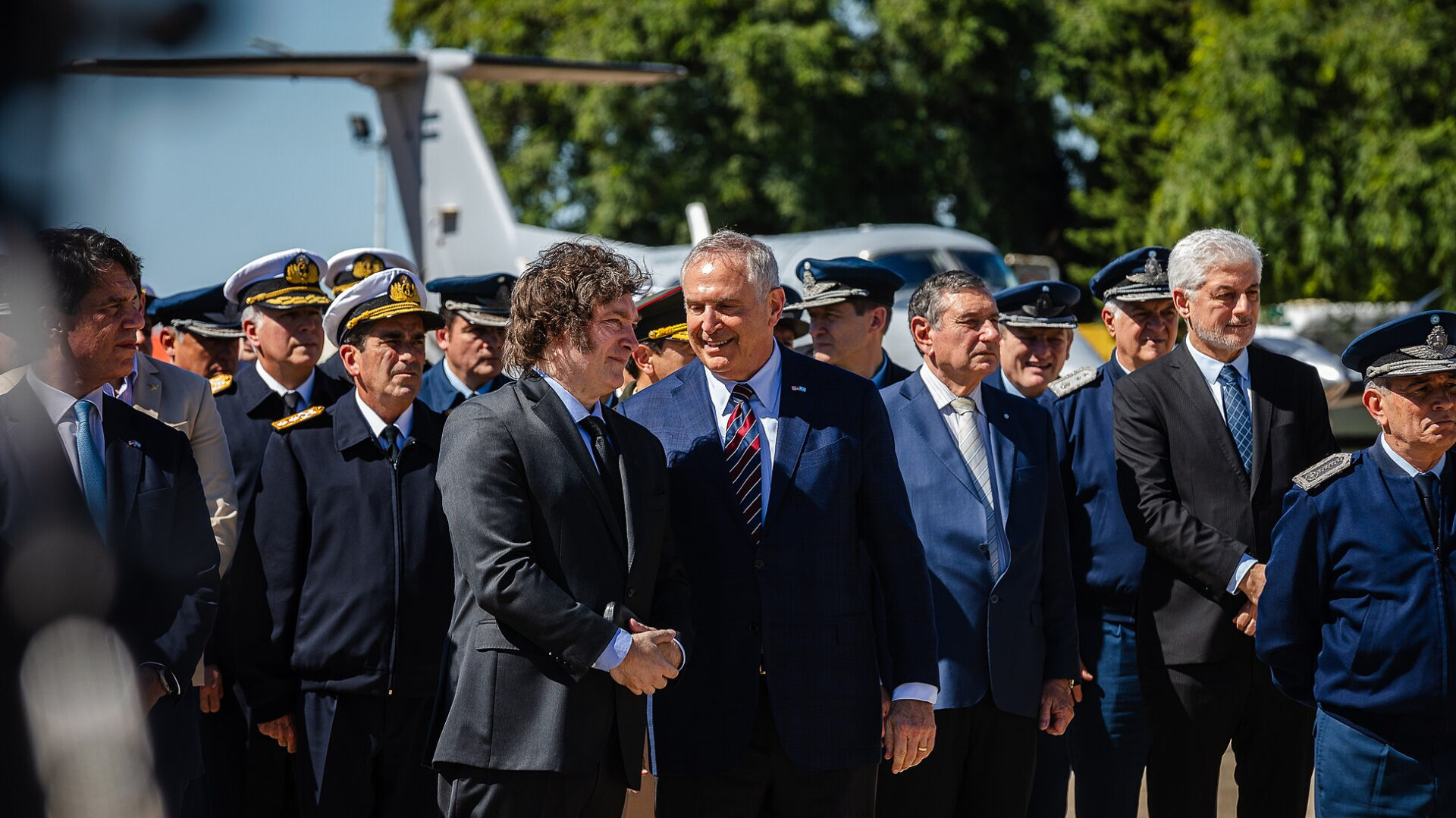Between 1976 and 1983, a military dictatorship ruled Argentina, earning a reputation for its use of torture, extrajudicial executions, and forced disappearances. Now, less than a year into Javier Milei’s presidency, the far-right leader is overseeing an effort to obstruct justice and cover up the history of crimes under that dictatorship.
On March 23, the day before the National Day of Remembrance for Truth and Justice, the Argentine presidential palace published a video titled “Memory, Truth, and Complete Justice,” which denied the consensus that 30,000 people went missing under the dictatorship. In the video, a former guerilla named Luis Labrana claimed that 30,000 victims was an invented number. Once social consensus had been reached on that statistic, he alleged, it helped “obscure the true history.” The video also accused Argentinian human rights organizations of profiting from the disappeared.
This is not the first time the statistics have faced scrutiny. In 2016, right-wing former President Mauricio Macri also cast doubt over the statistics. He said he had no idea whether there were 9,000 or 30,000 disappeared Argentinians. “It is a discussion that makes no sense,” Macri added.
Macri’s comments prompted a challenge from the Abuelas de Plaza de Mayo human rights group, which emphasized the importance of holding space for memory.
Tens of Thousands Killed or Disappeared
In 1984, a year after the fall of the dictatorship, Argentina’s first elected president, Raul Alfonsin, set up the National Commission of the Disappearance of Persons (CONADEP). He tasked the truth commission with investigating disappearances during the dictatorship. The report’s authors found documentation of 9,000 who were reported as disappeared. Citing widespread fears of coming forward among relatives of the disappeared, the commission estimated that the true number was between 10,000 and 30,000.
Declassified documents support the commission’s estimates. A document the National Security Archive published noted that the Argentine military had killed or disappeared an estimated 22,000 people between 1975 and mid-1978 alone. Using a pseudonym, Enrique Arancibia Clavel, a Chilean intelligence official who served as the country’s representative in Argentina for Operation Condor, sent that document to Chile’s National Intelligence Directorate (DINA) headquarters. It is the only known official record detailing the dictatorship’s kill toll. Consider that the dictatorship didn’t collapse until 1983, the figure of 30,000 could very well be accurate.
A Sinister Turn
Macri might have instigated the denial, but under Milei, it is taking a more sinister turn. Fulfilling a threat he made this July, Milei dissolved the special investigations unit within the National Commission for the Right to Identity (CONADI). That unit’s job was to find the children who disappeared during Jorge Rafael Videla’s dictatorship. President Nestor Kirchner established the unit in 2001.
Defending the dissolution, the country’s justice ministry argued that the unit, which operated under the executive branch, had “atrociously violated the fundamental right to privacy of Argentinians” as a result of its investigations. It also accused the unit of overriding the judiciary’s powers and violating the constitution, claiming that the unit violated the separation of powers.
Pablo Parenti, the prosecutor who oversees cases of children abducted during the dictatorship, has challenged the government’s official reason for shutting down the unit. Parenti told Pagina12 that the unit’s task is “to try to define a hypothesis to enable judges and prosecutors to carry out investigations on stronger grounds.” He also pushed back against the argument that the unit violated the separation of powers: it collaborated with the justice system on cases regarding abducted children. CONADI’s work, he explained, is similar to that of other executive branch bodies that carry out research related to the dictatorship, such as Conadep’s first report on the disappearances.
Threatening Collective Memory
During his brief time in office, Milei has taken actions that threaten to halt Argentina’s progress toward restoring justice and reclaiming the collective memory of the dictatorship years.
Although overriding the judiciary is purportedly the main reason Milei shut down CONADI’s Special Investigations Unit, the decree’s text suggests the government wants to shield the identity of the perpetrators involved in the abduction of children during the dictatorship.
The decree comes after a defense ministry decision last March to fire 10 out of 13 workers from the Equipos de Relevamiento y Analysis (ERyA). Since 2010, ERyA has been searching the Armed Forces’ archives for evidence that would prove the dictatorship’s crimes against humanity. The archives played a crucial role in identifying dictatorship agents, and the researchers compiled more than 170 reports that later aided judicial trials.
Lawyer Pablo Llonto, who has taken on the case of the dismissed researchers, noted that it was the research and compilations from the archives that allowed justice to prevail in court for crimes pertaining to the dictatorship era. Without the researchers, it is likely that military officers will assume the positions, thus making it easier for the state to shield the perpetrators and halt the process in identifying the disappeared and the stolen children of the dictatorship.
Blocking Accountability
Also in March, a defense ministry delegation visited Unit 34 in Campo de Mayo, which hosts convicted former dictatorship agents. The delegation listened to complaints by the former agents. Some requested conditional release from prison, and others urged the government to change the narrative on the dictatorship by declaring that a war had taken place.
The delegation met former agents including Juan Daniel Amelong, who participated in Operation Independence and whose home served as a detention and torture center, and Julio Hector Simon, a former police officer, Nazi adherent, and torturer at El Olimpo detention center in 1976.
This May, Milei attended a commemoration event for Carlos Menem, who served as Argentina’s president between 1989 and 1999. Menem had pardoned several former dictatorship agents, but in 2003, politicians revoked those pardons. The pardons were based on the Full Stop Law and the Due Obedience law, both enacted by Alfonsin in 1986 and 1987, respectively. The Full Stop Law established a statute of limitations for crimes against humanity, including torture and disappearance, while the Due Obediene Law shielded perpetrators below the rank of colonel from legal action unless involved in the disappearance and abduction of minors during the dictatorship.
In yet another move that echoes Argentina’s dictatorship past, Milei dissolved the Federal Intelligence Agency (AFI) and created a new agency called Secretaria de Inteligencia de Estadio (SIDE). The Center for Legal and Social Studies human rights watchdog criticized the move, accusing the government of attempting to grant impunity to the intelligence agency in the same way the dictatorship had for its intelligence.
Bringing Back Impunity
The Abuelas de Plaza de Mayo has been searching for the stolen and illegally adopted children since its creation in 1977. After its establishment in 1992, CONADI later became the first organization to collaborate with the Abuelas. So far, Abuelas de Plaza de Mayo have located 137 grandchildren and are still searching for more than 300 stolen children.
In response to the government’s attack on CONADI, Abuelas Plaza de Mayo released a statement demanding answers from the government on how the search for the missing grandchildren will resume. The organization also noted that the decree is part of a wider plan of erasing memory, linking it to six far-right deputies’ visit to the federal prison in Ezeiza, Buenos Aires, where former military and security forces agents are serving prison sentences for dictatorship-era crimes against humanity.
Manuel Adorni, a presidential spokesperson, claimed the visit was a personal matter for each of the deputies, but they traveled to the prison in a Chamber of Deputies vehicle. Beltran Benedit, one of the far-right deputies, later said of the visit: “We went to see former combatants who fought against Marxist subversion on the orders of a constitutional government.” They reportedly met Alfredo Astiz, a former torturer whose nickname is the “Angel of Death,” as well as former naval officer and torturer Ricardo Cavallo and intelligence agent Raul Guglielminetti, who was involved in Operation Condor and had links to the detention and torture center Automotores Orletti.
Uphill Battle
Meanwhile, Lourdes Arrieta, another of the deputies, leaked a series of chats which shed further light on the visit. Father Javier Olivera Ravasi created a WhatsApp group that included prominent individuals, among them lawyers and politicians. (Ravasi’s father, Major Jorge Antonio Olivera, is in prison for crimes against humanity during the dictatorship.) The aim was to concoct a plan to influence judges to commute the former dictatorship agents’ prison sentences to house arrest or full release.
Milei’s Minister of Security Patricia Bullrich participated in organizing the visit to political prisoners in Campo De Mayo, Ezeiza, and Marcos Paz. “They will be allowed to enter without any problem,” Ravasi wrote in one message. “It has already been agreed.” More alarming still, the leaked chats reveal plans to present plans for releasing the prisoners to Milei.
Milei denied any involvement or knowledge, as did Bullrich. However, Argentina’s Pagina12 offers a timeline of recent events that lines up the government’s actions to shield perpetrators, including Bullrich stating that she will not authorize CONADI to access files that would aid in the search of children stolen during the dictatorship. Forty years have passed since the CONADEP report, but Argentina is once again facing an uphill battle in the struggle for the country’s collective memory and justice.
Top photo: A photo shows Javier Milei in April 2024 during a ceremony for the US Embassy in Argentina’s donation of a C-130 (US Embassy in Argentina/Wikimedia Commons)














